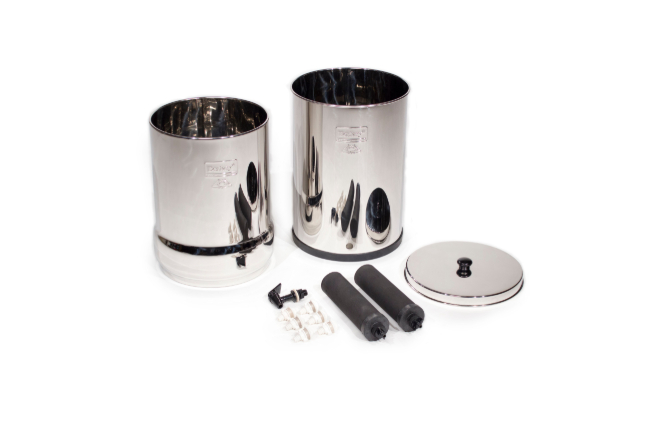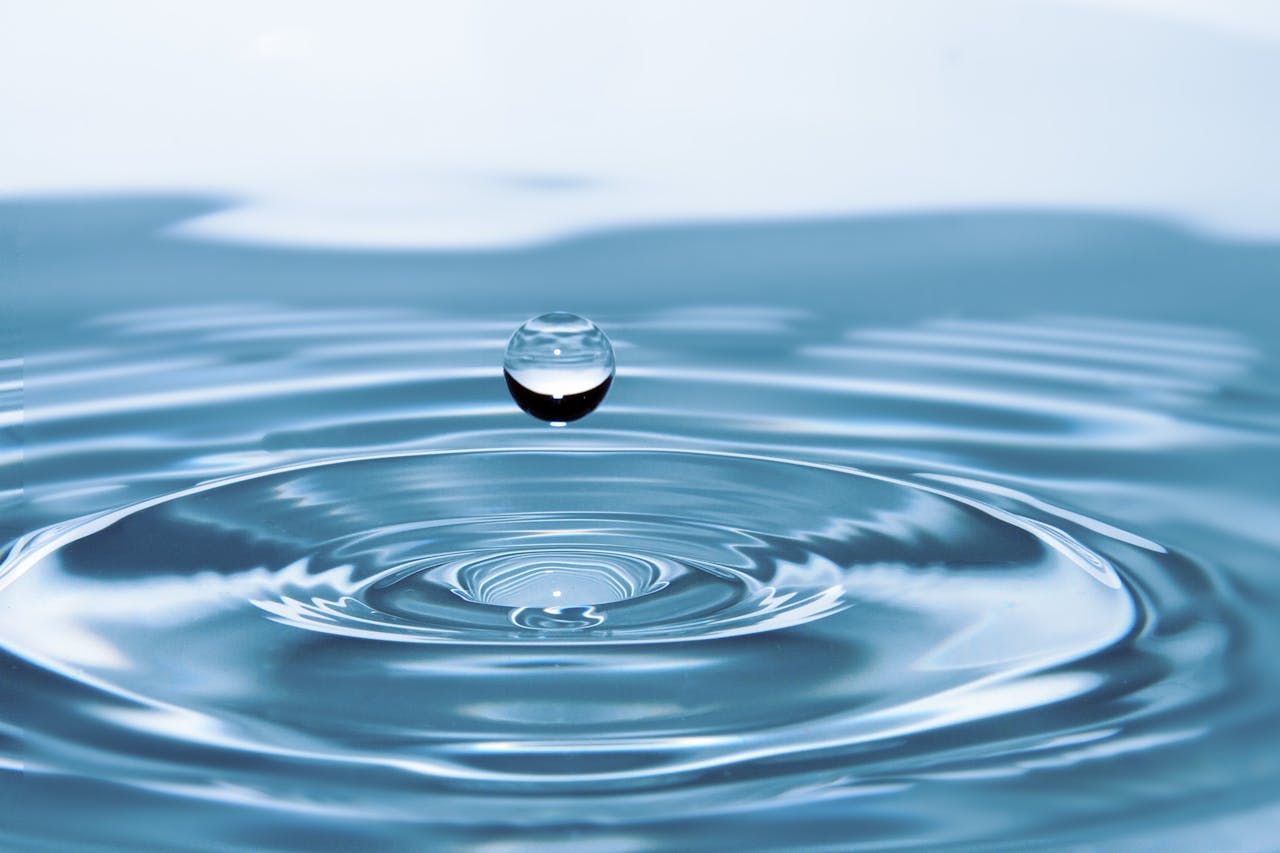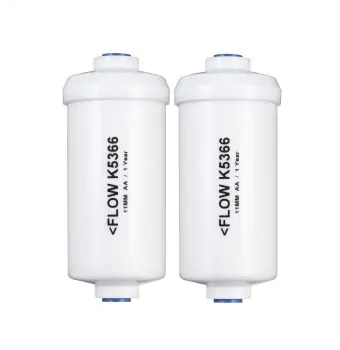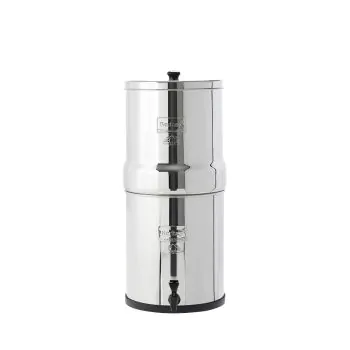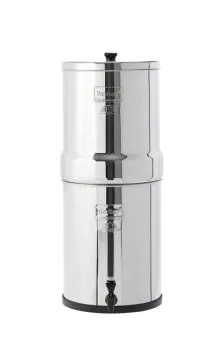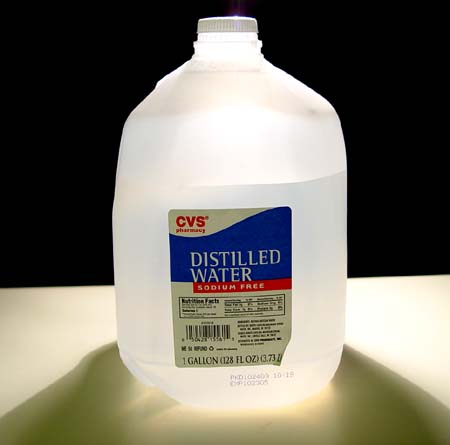Pharmacies and laboratories choose to use distilled water because it is water in it's purist form. The distillation process removes 99.9% of contaminants typically found in water, such as bacteria, chemicals and dissolved inorganic compounds.
Yet, while distilled water may be free of many pollutants, the jury is still out as to whether it is in fact safe to drink. The reason for the controversy is that minerals such as sodium, calcium and magnesium that are essential for our health are removed together with harmful pollutants during the distillation process.
In order to clearly understand the pros and cons of drinking distilled water, one first needs to understand the role that water plays within the human body, where the body obtains essential minerals from, and how these minerals are utilized by the body.
This article provides an overview or the arguments for and against drinking distilled water to help you make an informed decision as to whether drinking distilled water would be a good option for you.
Our Bestsellers
Is it Safe to Drink Distilled Water?
The distillation process is a natural process, much like the Earth's water cycle, that removes impurities from water, leaving water in its purist form. As no potentially harmful disinfectants or other chemicals are added during the process, it is considered safe to drink. However, it's what's removed from the water that is cause for concern.
The distillation process is so efficient at removing stuff from water that pretty much everything is removed — including minerals that are dissolved in the water, some of which serve important functions in the body. These minerals (sometimes referred to as electrolytes), which play an important role in cell signaling, are typically obtained via the food we eat. Yet, while water only contains trace amounts of these essential minerals, it can contribute to our daily needs. How significantly will depend largely on what we eat, how physically active we are, and our overall health.
Some common arguments for and against drinking distilled water include:
- Consumption of distilled water can cause dehydration and lead to health issues resulting from the lack of nutrients that are essential to our health.
- Consuming distilled water is okay because the human body is unable to absorb minerals dissolved in water into body tissue anyhow.
- Consuming distilled water may be beneficial for some, but not for others — particular those who do not obtain these minerals via an alternative source (diet or supplements).
Considering the average adult human body consists of around 60% of water, it stands to reason that we need to ensure that the water we fill our bodies up with is safe and that it benefits the cells and tissues in our body. The information below will help you to decide whether distilled water is a good choice for you, or whether another option would be better.
What Exactly is Distilled Water?
During the distillation process water is converted into steam, leaving bacteria and other contaminants, as well as impurities such as minerals, behind. Once the steam cools down, it condenses into liquid form again. The process replicates the water cycle found in nature, where water evaporates, cools and condenses in clouds, before falling to the ground as rain. A water distiller typically consists of two chambers: an evaporation chamber, and a chamber to collect the steam condensate, typically collected in a glass container.
What is Removed During the Distillation Process?
Distillation removes substances (good and bad) dissolved in water so that you won't be exposed them. It is also the method used for desalination of sea water to convert it to potable water. During distillation total dissolved solids (TDS) are removed from water. However, the distillation process itself will not remove volatile organic compounds (VOCs) from the water. To remove VOCs, the water must pass through a carbon filter after it has been processed by the water distiller system.
Contaminants and inorganic minerals can get into the water supply via various pathways. They can be washed off the surface with runoff or leach through soils to reach the groundwater. Chemical contaminants abound and are even a byproduct of the normal disinfection process. Contaminants can also get into water as it passes through the pipes on the way to your home. Many of the dissolved inorganic minerals typically found in water are harmless, but others such as arsenic and lead can be harmful to our health. However, anything in excess, including minerals, can potentially negatively affect our health.
Too Much of a Good Thing Can be Bad
Mineral levels in water vary from region to region. While many are harmless, sometimes even minerals that are beneficial to our health need to be removed for various reasons. High levels of calcium, for example, can result in hard water that can destroy household appliances. High levels of sodium or chloride can not only result in foul tasting water, but can also be harmful to plants and corrode pipes and plumbing. If the mineral content in your drinking water is excessive, a water distiller may be a good solution for removing contaminants as well as the potentially damaging minerals.
The distillation process renders water that is pure and safe to drink without changing the chemical properties of water. However, water that is free of minerals could potentially be more soluble, meaning it could absorb heavy metals such as lead as it passes through old pipes. This is one of the reasons why water treatment facilities do not use distillation to treat city water supplies. Since home water distillers treat the water as it comes out of the pipes there is no danger of it causing metals to leach from pipes.
Is Distilled Water Good For You?
Distilled water is not recommended for people who are malnourished or unwell; nor is it recommended for re-hydrating after an intense workout or other physical activity. But generally, for the average healthy person who is well nourished, drinking distilled water is not likely to have any negative side effects. Water contains dissolved inorganic compounds, including trace amounts of inorganic minerals, that can be absorbed by the body. If the body was unable to absorb these organic compounds from water, they wouldn't pose a health risk in the first place, and we wouldn't waste our time and money on efforts to remove them from drinking water. Having said that, organic compounds are more readily absorbed by the body than dissolved minerals; meaning food is a primary source of minerals, with water supplementing that.
Why Does Your Body Need Water?
There are several benefits of drinking water: it helps flush toxins and waste products from the body; helps to cool the body and prevent us from overheating; protects our cells, tissue and vital organs; lubricates our joints; and transports dissolved nutrients to cells and tissues throughout the body.
While water does provide the body with a source of essential minerals, this is not a key role of water. If you are lacking minerals, it is more beneficial to eat foods that are rich in minerals and nutrients than to drink lots of water. Water's primary role is to re-hydrate the body and replenish water lost during physical activity, and to dissolve minerals obtained from the food you eat so that these minerals can be transported to cells, tissues and organs in your body. Water also plays a key role in maintaining a state of cellular homeostasis.
Why Does Your Body Need Minerals?
Electrolytes are essential minerals needed by the body to communicate signals between our cells and to transport fluids to our muscles to prevent cramping. The foods that are highest in minerals are fruit and veggies, while the best foods to eat to rectify a calcium deficiency would be calcium-rich foods, as well as foods rich in vitamin D (which aids absorption of calcium) such as eggs and fish, or exposure to sunlight — another good source of vitamin D.
Individuals who only receive marginal amounts of minerals from their food intake are likely to benefit the most from minerals in drinking water. By the same token, these individuals are the most likely to suffer negative impacts of having minerals removed from drinking water. A malnourished person is less likely to be able to receive their daily mineral requirements through their food intake and may depend on water to meet these needs. However, in the United States, excessive intake of minerals such as sodium tends to be more of a health issue than undernourishment, and is the primary cause of high blood pressure.
What Happens to Surplus Minerals in the Body?
When mineral intake is higher than what the body requires, the excess minerals are excreted by the kidneys, which function more efficiently when more water is consumed. It is therefore important to keep your body well hydrated as water prevents the kidneys from becoming overburdened. After eating salty foods our brain sends out signals (sensation of thirst) that encourages us to re=hydrate. If we fail to quench our thirst we can become dehydrated. In a situation such as this, distilled water would be beneficial as our body doesn't require any additional sodium from the water.
Verdict: Should You or Shouldn't You Drink Distilled Water?
By now you should be aware that distilled water is undoubtedly one of the most pure forms of drinking water available. Harmful contaminants such as bacteria, arsenic and lead are removed, together with minerals that, depending on other factors, can have both good or bad effects on our health. Individuals who already have a high sodium intake may benefit from drinking distilled water. However, individuals who are malnourished, ill or have known mineral deficiencies, as well as those who undertake intense physical activity, are likely to benefit from minerals in water, in which case, drinking distilled water would not be recommended. Sweating, vomiting and diarrhea will cause the body to lose fluids and electrolytes, which if not replaced will lead to dehydration. Ultimately, whether distilled water is good or bad for you really depends on whether you need to obtain your daily intake of minerals from water or whether you get these from the foods you eat.
What are the Alternatives?
While distilled water may be good for some, its clearly not for everyone. The good news is that there are alternatives that are just as efficient at removing harmful contaminants, without stripping beneficial minerals from the water.
Carbon Filters
Drinking water purifiers fitted with activated carbon filters can remove a wider range of contaminants, for example VOCs, than distillation. Like distillation, activated carbon filters are able to remove a wide range of harmful chemicals, including chlorine and its byproducts, as well as pollutants that can give drinking water a foul taste or cause it to smell bad. The Berkey Water Fiilter line can also remove pathogenic bacteria, viruses and cysts, as well as heavy metals such as arsenic and lead, while leaving the beneficial minerals that are so critical for our health.

